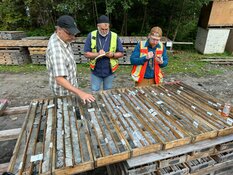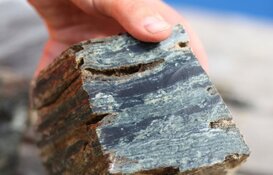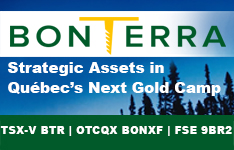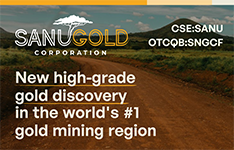The Gold Report: For the last five years, you've been predicting $5,000/ounce ($5,000/oz) gold. Are you still predicting that and what would drive it there?
Rob McEwen: Yes, and the reasons are even more pressing and relevant. The industrialized world has never before increased the money supply as fast and as large as it is today and government debt is at unimaginable and unsustainable levels. The central bankers' objective was to get the global economy back up and running, but so far it hasn't worked. Interest rates are dragging along the floor and have forced investors and savers to desert their prudent ways and seek riskier investments in a frantic search for yield. Our governments want us to spend, to consume believing this will keep the economy afloat. But they are wrong and pushing the wrong levers. What we need urgently is capital investment that creates jobs and expands the tax base. Unfortunately, this is not happening.
On top of this setting, there appears to be a number of powerful countries that want to remove the U.S. dollar from its role as the reserve currency of the world. These players have been strategically moving to reduce the role of the dollar in their economies and lessen the need to buy dollars to buy oil, food and other essential commodities.
TGR: But if all that money printing hasn't taken the price of gold up in the last five years, why would it do that at a later date?
RM: At some point soon, people are going to question the value of the dollar. Too many people believe the government can control interest rates and inflation. People are going to realize that the government is not telling us the truth about the economy, about inflation, about having the economy under control. When that happens investors will rush to diversify and put funds into gold and silver. Right now is an appropriate time to start buying gold. It is cheap and gold shares are even cheaper. What most investors don't appreciate is the fact that gold has been going up significantly in the past year and a half in many currencies other than the dollar. Soon it will also climb in dollar terms.
How high will it go? Here's some simple math to show what is possible. From 1970 to 1980 gold went from $40/oz to $800/oz, an increase of 20 times. The low in this cycle has been $250/oz. If you apply the same factor of 20, you're at $5,000/oz.
TGR: What's the time frame for your prediction?
RM: Four years out, in that time the dollar will have given up its premium position in the currency world and many more investors will be buying gold. The combination of crowd psychology and instantaneous communication are going to propel the price of gold to new heights that most people can't imagine today.
TGR: If that's the case for gold, what are the prospects for silver?
RM: Silver will follow gold's upward climb and the gold/silver exchange ratio will compress in the future. It will go from the current high of 75:1 to potentially as low as 16:1.
TGR: As an investor, does it matter if gold goes to $5,000/oz if the operating costs and the capital expenditure (capex) costs continue to go up the way they have in previous cycles?
RM: Sure, but that scenario is not going to happen right away. I expect the gold price will increase far faster than the costs of producing it for several years. During that period, investors enjoy large gains due to the dramatically increased profit margins.
TGR: You've talked a lot about the role of technology. Could technology help to smooth out the ebb and flow?
RM: No, I do not believe that technology will alter the ebb and flow because mining is a cyclical industry, but technology could significantly improve the industry's profitability. Unfortunately, the mining industry has a lot of inertia, so it tends to adopt new technology slowly. However, there are signs that its adoption rate is accelerating. Take a look at the YouTube video on Rio Tinto Plc's (RIO:NYSE; RIO:ASX; RIO:LSE; RTPPF:OTCPK) Mine of the Future to get a good idea of how mining is changing.
On the wish list are: faster discoveries, faster resource modeling, speedier permitting, faster construction, lower capex and operating expenditures (opex), higher recoveries, faster payback, higher returns on invested capital, smaller environmental footprint and, most importantly, superior returns to shareowners. While this is quite the laundry list, it highlights the significant opportunity for improvement.
TGR: Is demanding innovation and austerity the role of the board, the shareholders or management? Where does the mindset change start?
RM: Shareowners buy or sell depending on their assessment of management's performance. The board should encourage and support management in embracing innovation and demand that management strive to always be efficient and productive with shareowners' capital.
TGR: You've been a mining executive for decades, but you're also an investor. You have 25% ownership in McEwen Mining Inc. (MUX:TSX; MUX:NYSE ) where you still serve as chairman. What do you look for in a mining company when you're thinking about making an investment?
RM: First, I listen to management's pitch and if it sounds interesting; second, I ask about their share ownership and if I find they are talking a big story without having a large investment in their firm, then my interest starts to fade. But, third, I look at how the market is pricing the company. If its shares appear to be selling at a large discount my interest can return. I tend to take large positions in explorers and small producers that I feel have big upside potential.
And for the record, at McEwen Mining I take no salary, receive no bonus, had no options and the cost of my investment is $126 million. I wanted to be closely aligned with the interests of my fellow shareowners. We will both make money the same way, through a higher share price!
TGR: What do you look for in the resource itself? Are you focused on country risk? Are there countries you won't invest in, or do you have a short list of favorite countries?
RM: The location of a resource is very important. There are definitely countries that are unattractive to me, especially where there is no rule of law, high crime rates and greedy governments. Experience has narrowed my focus to the Americas and perhaps Europe. I have no interest in putting my staff's lives at risk. In addition, I wish to avoid exposure to regions where corrupt practices are commonplace and the potential for us to get ensnared inadvertently in the new foreign corrupt practice laws that have been enacted here at home.
TGR: How do you protect yourself against those risks?
RM: It requires much more due diligence and vigilance than ever before. Governments worldwide seem to think the mining industry hasn't been paying its share, despite the big investments made by the industry in infrastructure, employment and communities. They have a nasty habit of changing the rules, such as increasing taxes and taking larger interests in the mines without compensation, after companies have spent the capital and built the mines.
I'd like to see the mining industry unite and stand up to all governments. We need to tell the politicians that if they want us to invest our capital in their country, they have to give us iron-clad guarantees that they will honor the terms of the agreement. They should have to put in place financial instruments, financial guarantees that will return our invested capital, at a minimum, if they change the rules under which we invested. One such way to ensure that they keep their part of the agreement is to require them to put up a letter of credit, equal to our investment, in a major financial center outside their country. And should they violate the terms of our contract with them then we take away the funds we invested, without any recourse to their legal system.
TGR: What about physical risk? You recently had a significant breach in Mexico. How do you deal with that?
RM: There is a powerful crime element in Mexico. Some regions of the country are much worse than others. Until our recent robbery we had little to complain about. Since then, we consulted with Brinks and other security experts and we have fortified our refinery and mine property in addition to having a detachment of state police on the property.
TGR: What do you look for on a balance sheet?
RM: Debt, forward sales and property ownership issues such as joint ventures or options that could reduce the shareholders' value.
TGR: Does that include hedging, royalties, streams, those sorts of things? Do you consider that debt?
RM: Absolutely, I consider those financial mechanisms a disaster. The sale of metal streams and the royalties have been one of the biggest sins committed by the industry. Many management teams view these financing vehicles as nondilutive and easy money. It's 7-11 money, convenience store money, and management grossly overpays for this money and their shareowners end up paying a very big price in terms of lost cash flow and profits. The evidence is glaring; the share price performance of the metal streaming and royalty companies have far outperformed that of the producers.
The market has spoken loud and clear; investors don't want to buy a producer that has sold a good part of its future revenue. The impact of streams and royalties has been particularly painful during this period of low metal prices, as these instruments have hammered operating margins. A number of mining CEOs say it's the only reasonable source of financing they can secure now, but to my mind their actions appear to be a Faustian bargain. They are selling their shareowners' future profit to the devil and he has come to collect it.
TGR: Now I want you to name three companies you think fit the criteria you just spelled out.
RM: McEwen Mining (MUX:TSX; MUX:NYSE), of course. It has huge insider ownership, positive cash flow, good optionality in terms of the gold and silver properties, in addition to its very large copper project, and exploration potential in Nevada, Mexico and Argentina. Despite the low gold and silver prices, it has been generating increasing free cash flow over last three quarters, the treasury has been growing and the balance sheet is solid with a small amount of debt. Management exercises fiscal discipline and will not build a mine unless the project can generate a 20% internal rate of return (IRR), has a low capex and a capital payback in three years or less. There is no harm leaving the gold or silver in the ground and waiting until the prices improve before raising capital to build.
TGR: Two other companies that fit those criteria?
RM: One is GoldQuest Mining Corp. (GQC:TSX.V). The company's property is located in the Dominican Republic, so it is nearby and in a stable environment. Its management team has a successful record of discovery, mine development and building value for their shareowners. Its Romero property has an attractive grade and good exploration potential. It has not encumbered itself with royalties or metal streams, has no debt and has a small but sufficient treasury to keep moving the project ahead. I must disclose that I own 9% of the company.
TGR: At the Silver Summit, Rick Rule talked about that fiscal restraint. What is GoldQuest doing that's showing fiscal restraint?
RM: GoldQuest has used this down time in the market to develop a robust preliminary economic assessment. The results show the project has the characteristics that I look for: payback is less than three years, better than 20% IRR and relatively low capex and opex. The company also has not issued a large number of shares at current low share prices and has not diluted its shareowners for the purpose of filling up its treasury.
TGR: Give me one more you like?
RM: The next company may sound a bit odd given my early protests against metal streaming and royalties. I have no problem owning these instruments; I just believe companies should not be selling them. That said, my third recommendations is Abitibi Royalties Inc. (RZZ:TSX.V). It is a young company run by a clever young man, Ian Ball, who was one of my first hires at McEwen Mining and prior to that he worked for me at Goldcorp Inc. (G:TSX; GG:NYSE). The company is generating positive cash flow, has a solid, liquid balance sheet, no debt and a small number of shares outstanding. It has one royalty income stream that is expected to grow and the company has been picking up strategically located royalties next to existing production. In addition, it has been using the Internet to acquire royalties at a very low cost. I am a 9% shareowner.
TGR: How long might it take for that to pay off?
RM: I don't know the precise timing, but I am confident its price is heading higher.
TGR: But you're a long-term investor?
RM: I like to be a long-term investor rather than a trader. During the 19 years that I ran Goldcorp, I was comfortable to hold my shares for the long term despite the ups and downs in the market. Perhaps because I was a large shareholder and the CEO that I believed that management and I could and would build greater share value over time. Another reason for my long-term view is market driven—shareowners don't like to see management selling.
TGR: Why don't you think most investors share that long horizon view?
RM: I believe the continuous and incessant nature of news media's coverage of the market encourages and promotes a trading mentality. There is an unhealthy and unachievable focus on making quick, big profits. Long-term investments are viewed by many as old school and boring.
TGR: You've been through a number of these cycles. Is there anything we missed that investors can learn from your experience?
RM: When you observe an inordinate number of new issues or secondary issues coming out in a short period of time and the media is full of stories of ever higher prices, that is usually a good indication that you're nearing a top.
TGR: So it's easier to see a top than a bottom?
RM: Both are difficult to see but there are some market clues. The bottom is usually close when there is tiny trading volume, no one is doing any financings and the media is full of stories about ever lower prices. Today feels like we are very near the bottom.
TGR: Thank you for your time.
Read which companies participants at the Silver Summit selected as their winners in The Gold Report article "Crowdsourcing Uncovers Best Resource Companies at Silver Summit."
Rob McEwen is the chairman and chief owner of McEwen Mining Inc. He is the founder and former chairman and CEO of GoldCorp Inc. McEwen was awarded the Order of Canada in 2007 and the Queen Elizabeth's Diamond Jubilee Award in 2013. He holds an Honorary Doctor of Laws and a Master of Business Administration from York University and a Bachelor of Arts from the University of Western Ontario. He received the 2001 PDAC Developer of the Year Award.
Want to read more Gold Report interviews like this? Sign up for our free e-newsletter, and you'll learn when new articles have been published. To see a list of recent interviews with industry analysts and commentators, visit our Streetwise Interviews page.
DISCLOSURE:
1) JT Long conducted this interview for Streetwise Reports LLC, publisher of The Gold Report, The Energy Report and The Life Sciences Report, and provides services to Streetwise Reports as an employee. She owns, or her family owns, shares of the following companies mentioned in this interview: None.
2) The following companies mentioned in the interview are sponsors of Streetwise Reports: None. Goldcorp Inc. is not affiliated with Streetwise Reports. The companies mentioned in this interview were not involved in any aspect of the interview preparation or post-interview editing so the expert could speak independently about the sector. Streetwise Reports does not accept stock in exchange for its services.
3) Rob McEwen: I own, or my family owns, shares of the following companies mentioned in this interview: McEwen Mining Inc., GoldQuest Mining Corp. and Abibtibi Royalties Inc. I personally am, or my family is, paid by the following companies mentioned in this interview: None. My company has a financial relationship with the following companies mentioned in this interview: None. I was not paid by Streetwise Reports for participating in this interview. Comments and opinions expressed are my own comments and opinions. I determined and had final say over which companies would be included in the interview based on my research, understanding of the sector and interview theme. I had the opportunity to review the interview for accuracy as of the date of the interview and am responsible for the content of the interview.
4) Interviews are edited for clarity. Streetwise Reports does not make editorial comments or change experts' statements without their consent.
5) The interview does not constitute investment advice. Each reader is encouraged to consult with his or her individual financial professional and any action a reader takes as a result of information presented here is his or her own responsibility. By opening this page, each reader accepts and agrees to Streetwise Reports' terms of use and full legal disclaimer.
6) From time to time, Streetwise Reports LLC and its directors, officers, employees or members of their families, as well as persons interviewed for articles and interviews on the site, may have a long or short position in securities mentioned. Directors, officers, employees or members of their families are prohibited from making purchases and/or sales of those securities in the open market or otherwise during the up-to-four-week interval from the time of the interview until after it publishes.














































